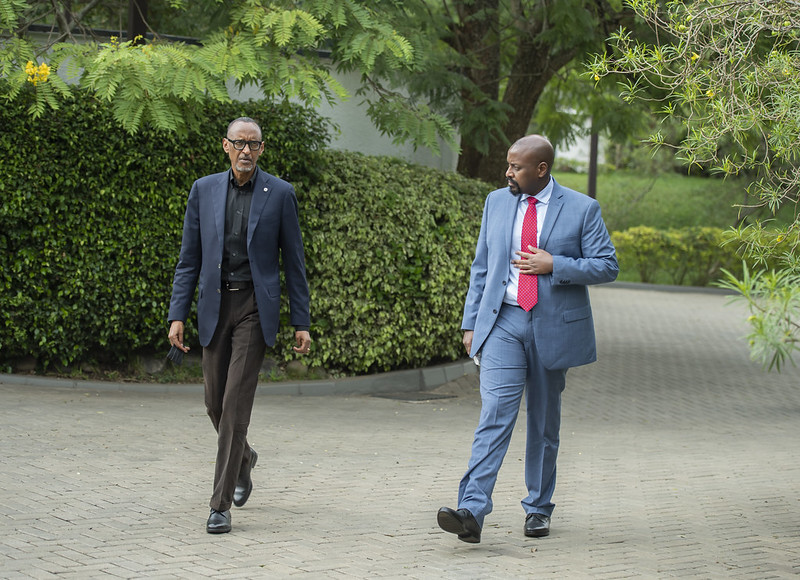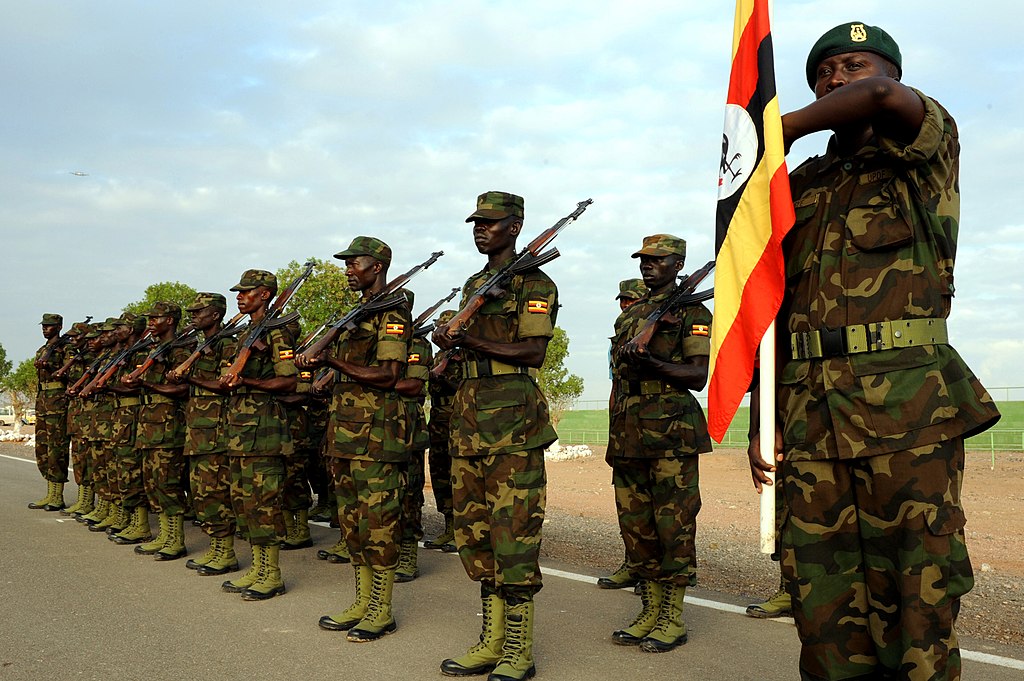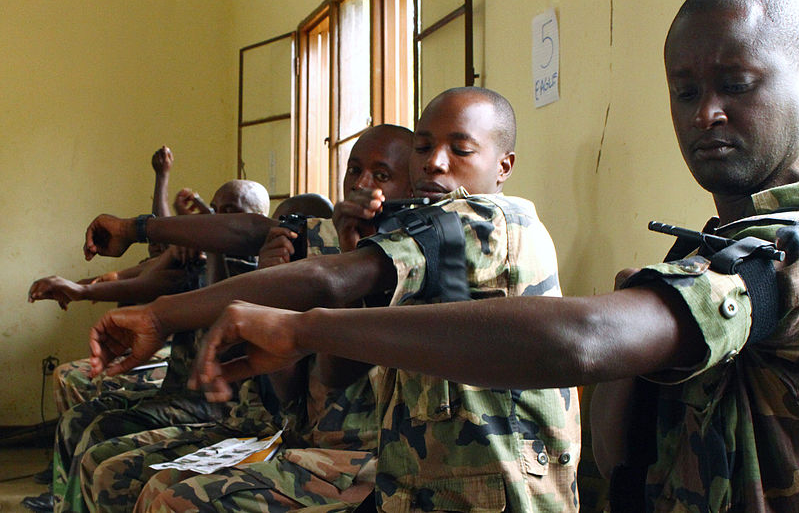
Ugandan General Muhoozi Kainerugaba (right), meets with Rwandan President Paul Kagame (left) in Kigali, Rwanda on 22 January 2021.
“Call me Putinist if you want, we Uganda should send soldiers to defend Moscow if ever it was threatened by imperialists.”
Over the past several years, a notable trend has seen various francophone states in the West and Central African regions begin to reject French political and military assistance, and instead, align themselves with Russia and the Wagner Group.[i] From Mali[ii] to the Central African Republic[iii] to Burkina Faso,[iv] the most ardent African supporters of Russia have generally been francophone military commanders. However, the accompanying article from pan-African news aggregator AfricaNews illustrates how pro-Russian sentiment is now increasingly showing itself in anglophone countries, namely, in the East African state of Uganda.
As reported, Ugandan Lt. Gen. Muhoozi Kainerugaba made waves when he announced that if needed Uganda would send troops to help Russia defend itself. “Call me ‘Putinist’ if you want, we Uganda should send soldiers to defend Moscow if ever it was threatened by imperialists,” he tweeted. The only son of Uganda’s long-time president Yoweri Museveni, Kainerugaba is widely expected to be his father’s successor, the latter having served as the country’s president for the past 37 years. Kainerugaba, who attended the U.S. Command and General Staff College at Ft. Leavenworth, Kansas, previously served as the commander of land forces for the Uganda People’s Defence Force (2021-2022), and twice as the commander of Uganda’s Special Forces Command (2008-2017, 2020-2021).
The recent pro-Russian sentiments from Kainerugaba are in line with his own previous exaltations. In May 2022, he tweeted that “The majority of mankind (that are non-white) support Russia’s stand in Ukraine. Putin is absolutely right!” For its part, Uganda has abstained from the two 2022 UN Security Council resolutions condemning Russia, and in mid-2022, announced that its state broadcaster had signed a memorandum of understanding to disseminate two daily news bulletins from Russia’s state-funded RT news service. Though President Museveni has historically maintained good relations with the West, he has often been criticized for his illiberal rule. While Kainerugaba’s outlooks are officially only his personal opinions, his high-profile role in the Ugandan armed forces and Ugandan society in general, in addition to the real likelihood that he may assume the presidency of the country, suggest that an anglophone African country that was once a reliable U.S. ally may now be leaning more toward a key U.S. adversary.
Source:
Uganda will send soldiers to Moscow to defend Putin if need be – President’s son,” AfricaNews (centrist pan-African news aggregator,” 31 March 2023. https://www.africanews.com/2023/03/31/uganda-will-send-soldiers-to-moscow-to-defend-putin-if-need-be-presidents-son//
The son of Ugandan leader Yoweri Museveni, Muhoozi Kainerugaba, said he would send Ugandan troops to defend Moscow in case of an “imperialist” threat.
“Call me Putinist if you want, we Uganda should send soldiers to defend Moscow if ever it was threatened by imperialists,” he wrote on Twitter.
“The West is wasting its time with useless pro-Ukrainian propaganda,” added the president’s son, a staunch supporter of Vladimir Putin…
Uganda has abstained from UN votes on the Ukrainian conflict, including one in February on the first anniversary of the Russian invasion of Ukraine, which called on Moscow to withdraw its troops from the country…
In July, during a tour of Africa by Russian Foreign Minister Sergei Lavrov, Kainerugaba said, referring to Russia, “How can we be against someone who has never hurt us?
Russia has traditionally had strong ties to Africa because of its support for independence movements on the continent that were then struggling with colonial powers.Observers have long considered Muhoozi Kainerugaba to be a likely successor to his father Yoweri Museveni, 78.
Notes:
[i] For more on Russian attempts to garner African allies, especially following its invasion of Ukraine, see: Jason Warner, “Russia Laying Groundwork Ahead of July 2023 Russia-Africa Summit,” OE Watch, 1-2023. https://community.apan.org/wg/tradoc-g2/fmso/m/oe-watch-articles-2-singular-format/434265; Jason Warner, “”African Stances on the Russia-Ukraine War Demonstrate Reliance on, Antipathy Toward West,” OE Watch, 9-2022. https://community.apan.org/wg/tradoc-g2/fmso/m/oe-watch-articles-2-singular-format/425767
[ii] For more on the relationship between Mali, France, and Russia, see: Jason Warner, “Mali Claims France Funded Terrorists: France Denies,” OE Watch, 10-2022. https://community.apan.org/wg/tradoc-g2/fmso/m/oe-watch-articles-2-singular-format/428171; Jason Warner, “Mali Defends Reliance on Russian Counterterrorism Assistance,” OE Watch, 03-2023. https://community.apan.org/wg/tradoc-g2/fmso/m/oe-watch-articles-2-singular-format/437332
[iii] For more on the deteriorating relationship between the Central African Republic and France, see: Jason Warner, “Following Mali, CAR Accuses France of Funding Terrorists,” OE Watch, 4-2023.
[iv] For more on the relationship between Burkina Faso, France, and Russia, see: Jason Warner, “Burkina Faso Fights Terrorism with Recruits and Russia,” OE Watch, 02-2023. https://community.apan.org/wg/tradoc-g2/fmso/m/oe-watch-articles-2-singular-format/436264
Image Information:
Image: Ugandan General Muhoozi Kainerugaba (right), meets with Rwandan President Paul Kagame (left) in Kigali, Rwanda on 22 January 2021.
Source: https://www.flickr.com/photos/paulkagame/51836255739
Attribution: CC BY-NC-ND 2.0


